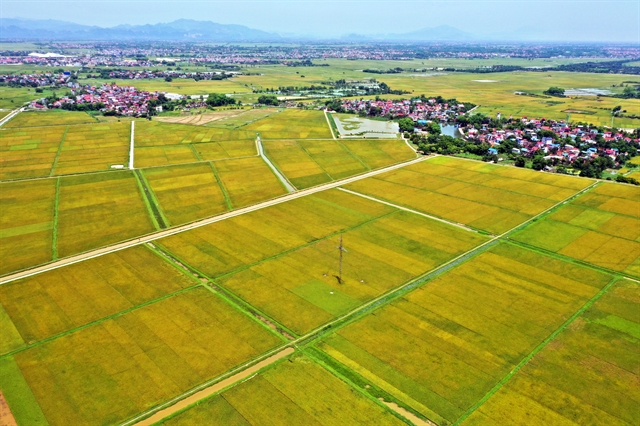 Society
Society

 |
| With effective utilisation of foreign investment capital, the capital city is well-positioned to transform its peri-urban areas into strategic hubs for the production of high-value agricultural commodities. — Photo from the Hà Nội's Department of Agriculture and Environment |
HÀ NỘI — Hà Nội’s agriculture sector is quietly flourishing, proving that fields can thrive on the outskirts of the capital city.
The city’s peri-urban farms are transforming into hubs of innovation and export success, driven by investment and technology and helping to secure food for millions.
Amid rapid urbanisation, Hà Nội’s agricultural sector stands as a resilient backbone, supporting food security, fostering rural development and increasingly carving out a role in global value chains. Despite the pressures from expanding city limits, this traditional sector has been revitalised through strategic reforms and technological advances, enhancing both productivity and sustainability.
In recent years, the Hà Nội Department of Agriculture and Environment has implemented policies that have reshaped all facets of agriculture — from crop cultivation and livestock farming to aquaculture. These efforts are not just modernising the rural landscape but also promoting what officials call 'new-style rural development.'
Scientific progress has been pivotal: improved seeds, mechanised farming and digital agriculture techniques (aligned with Industry 4.0 standards) have increased efficiency and farmers’ incomes. The economic return per hectare has risen steadily, reflecting a shift to high-value, sustainable agriculture that benefits the environment and local communities alike.
Former Director of the Hà Nội Rural Development Sub-Department Nguyễn Văn Chí highlights the sector’s remarkable growth: agricultural output surged from VNĐ7 trillion (approximately US$266 million) in 2008 to over VNĐ59 trillion ($2.2 billion) today — an eightfold increase. This achievement places Hà Nội among the top-performing localities in the Red River Delta.
Even in 2024, a year challenged by natural disasters and market instability, the sector remained robust. The city cultivated over 153,000 hectares of rice, producing upwards of 862,000 tonnes.
Livestock production also improved, with pork up by 2.7 per cent, poultry by 3.5 per cent, eggs by 4.8 per cent and fresh cow’s milk by nearly 2 per cent. These gains contributed to an overall growth of 2.52 per cent in the agro-forestry-fishery sector, bolstering the city’s gross regional domestic product (GRDP).
Beyond local supply, foreign direct investment (FDI) is proving crucial for Hà Nội’s agricultural modernisation. Recent FDI projects have introduced advanced cultivation techniques, post-harvest processing and food safety measures, aligning local produce with international standards and expanding export potential.
Dr Nguyễn Hữu Cường from the Ministry of Science and Technology emphasises the opportunity for Hà Nội: “If the city capitalises on high-quality FDI, especially those linked to cutting-edge technology, suburban areas can be transformed into production hubs for high-value goods, meeting domestic needs and accessing global markets.”
Hà Nội enjoys several competitive advantages — proximity to financial and commercial centres, strong logistics infrastructure, a skilled workforce and a large domestic market with rising demand for safe, high-quality food products. These factors make the city highly attractive to investors focused on sustainable and tech-driven agriculture.
Experts underline that the sector must evolve beyond traditional farming towards a diversified, digitally integrated agricultural economy. This transformation will enhance competitiveness and serve as a 'passport' for deeper integration into global value chains.
Director of Hà Nội’s Department of Agriculture and Environment Nguyễn Xuân Đại notes that the city now hosts nearly 400 specialised production zones, 159 safe supply chains connecting farms to consumers and 406 high-tech agricultural models — accounting for 46 per cent of total production value.
Exports from Hà Nội’s agricultural, forestry and fishery sectors are expected to exceed $2 billion in 2024, reflecting the growing reach of peri-urban agriculture beyond local markets.
The city’s agricultural and traditional craft products have gained international recognition, with export markets spanning over 40 countries and territories. Meanwhile, craft villages contribute over VNĐ24 trillion in production value.
Though Hà Nội lacks the vast farmlands of the Mekong Delta, its urban consumer base willing to pay for quality and traceability fosters a unique environment for agricultural innovation.
With ongoing FDI support for post-harvest technologies, deep processing, traceability and market connectivity, Hà Nội’s produce is poised to become trusted brands globally.
With supportive policies, strong collaboration between government, enterprises and investors and an innovative mindset among farmers, Hà Nội’s agriculture is set to evolve from a traditional safety net into a platform for sustainable growth and global competitiveness.
The vision is clear: the city’s peri-urban fields will become 'green production workshops' that secure food supplies and raise Hà Nội’s agricultural profile on the world stage. — VNS